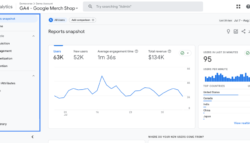Greetings! I'm Aneesh Sreedharan, CEO of 2Hats Logic Solutions. At 2Hats Logic Solutions, we are dedicated to providing technical expertise and resolving your concerns in the world of technology. Our blog page serves as a resource where we share insights and experiences, offering valuable perspectives on your queries.

Online shopping is taking off, growing fast and becoming more popular by the day! Nowadays lots of people buy stuff on the internet. Even regular stores are focusing more on their online shops. To stay ahead in this competitive online world, you need certain tools that make running your online business easier. These tools are really important for growing your business and staying successful in the always-changing online market. Ecommerce tools are significant in scaling your business and You need certain ecommerce tools that are vital for success in the ever-evolving online marketplace.
Best Ecommerce Tools to Scale Your Business in 2024
- Google Trends
- SEMrush
- Ahrefs
- Shopware
- WooCommerce
- Magento
- Shopify
- Mailchimp
- Buffer
- Hootsuite
- Google Analytics
- Hotjar
- Zendesk
- LiveChat
- Helpscout
What are ecommerce tools? Why are they important?
Ecommerce tools are software that makes online store management easier and more efficient, helping to boost sales and keep customers happy. Ecommerce tools are important because they streamline processes, increase sales, improve customer satisfaction, and ultimately contribute to the overall success and growth of online businesses.
Best Ecommerce Research Tools
1. Google Trends

Google Trends is a very useful tool that provides the right information for search trends. This provides information and the popularity of specific keywords over time. It helps ecommerce businesses understand consumer interests. By doing proper analysis you can identify seasonality patterns, and make data-driven decisions for the success of your ecommerce business.
Main Features
- It Offers real-time data
- Information about regional and global insights
- Answers related queries
- Shows the trending topics
2. SEMrush

SEMrush is a comprehensive SEO and marketing tool that offers competitive analysis. Using this research tool you can conduct keyword research, backlink analysis, and more. It helps ecommerce businesses optimize their online presence, improve search rankings, and gain organic traffic.
Main Features
- It provides detailed keyword analytics
- You can conduct domain and competitor analysis
- It has site audit tools
- It provides position-tracking
- PPC research is available
3. Ahrefs

Ahrefs is an all-in-one SEO toolset that helps ecommerce businesses. This ecommerce tool helps with backlink analysis keyword research, competitor analysis, and rank tracking. It provides valuable insights to improve search visibility and organic traffic.
Main Features
- It Offers extensive backlink data
- Find keyword difficulty scores
- You can conduct a content analysis
- It has site audit tools
- It has rank tracking for target keywords
Provides insights into competitors’ strategies and helps identify growth opportunities.
These tools collectively empower ecommerce businesses to conduct thorough research, understand market trends, analyze competition, and optimize their online strategies for better visibility and success.
Top Ecommerce Website Building Tools
4. Shopware

Shopware is a robust and flexible ecommerce platform that caters to businesses of all sizes, offering customizable themes, responsive design, and a user-friendly interface. Its best performance in Germany underscores its significance as a top e-commerce website building tool. Shopware is not only excelling in Germany but also gaining traction across the globe. Customers worldwide are drawn to its modern features and intuitive design, making it a preferred choice for businesses in various regions. Its growing popularity globally speaks to its effectiveness as an advanced e-commerce solution that meets the evolving needs of online businesses. Upgrading to Shopware 6 is recommended, especially with the assistance of a trusted Shopware agency, to ensure the best customer experience.
Main features
- It has a responsive design for mobile-friendly websites
- It has customizable Shopware themes and templates
- Integrated marketing tools for promotions and campaigns are available
- Shopware has SEO capabilities for better search engine rankings
5. WooCommerce

WooCommerce is a popular ecommerce plugin for WordPress, offering a seamless integration with the CMS. It’s highly customizable and scalable, making it ideal for small businesses and large enterprises alike.
Main features
- It is easy to setup and integrate with WordPress
- It has an extensive range of plugins and extensions for additional functionality
- There is flexible product management and inventory tracking
- Secure payment gateways for smooth transactions
6. Magento

Magento is a comprehensive ecommerce platform known for its adaptivity and customization options. Magento caters to businesses with complex requirements and high traffic volumes.
Main features
- Scalable architecture for handling large product catalogues and high-traffic
- Customizable themes and layouts for unique branding
- Advanced marketing and promotional tools for customer engagement
- Efficient security features to protect data
7. Shopify

Shopify is a user-friendly ecommerce platform that allows you to create and manage online stores with ease. It’s known for its simplicity, extensive app store, and reliable hosting services.
Main features
- Drag-and-drop store builder for easy customization
- Integrated payment gateways for seamless transactions
- App store with thousands of plugins for added functionality
- Functional and mobile responsive design for better performance
Top Ecommerce Marketing Tools
8. Mailchimp

Mailchimp is an email marketing platform. This ecommerce tool allows businesses to create and send personalized email campaigns to their customers.
Main features
- Email campaign builder allows you to easily create and design professional-looking emails using customizable templates.
- Segment your email list based on customer data to send targeted and relevant messages.
- Using Mailchimp you can automate email workflows such as welcome emails, and abandoned cart reminders.
- A/B testing is like testing different email variations to optimize open rates, click-through rates, and conversions.
9. Buffer

Buffer is a social media management tool that allows ecommerce businesses to schedule, publish, and analyze their social media posts across multiple platforms.
Main features
- Plan and schedule posts for social media platforms like Facebook, Twitter, Instagram, and LinkedIn.
- Visualize your social media content schedule and manage posts in advance.
- Collaborate with team members by assigning tasks, managing approvals, and sharing access.
- Social media listening means monitoring mentions, comments, and conversations related to your brand on social media.
10. Hootsuite

Hootsuite is a comprehensive social media management platform that allows ecommerce businesses to manage all aspects of their social media presence.
Main features
- Using this tool you can easily publish the scheduled posts in various social media platforms from one dashboard.
- Monitor social media conversations, mentions, and trends related to your brand or industry.
- Discover and share relevant content from sources like RSS feeds, industry influencers, and trending topics.
- Track key social media metrics such as engagement, reach, impressions, and follower growth.
- Collaborate with team members, assign tasks, and manage permissions for different social media accounts.
Top Ecommerce Analytics Tools
11. Google Analytics

Google Analytics is a powerful web analytics tool that helps ecommerce businesses track and analyze their website traffic and user behaviour.
Main features
- This ecommerce tool monitors visitor activity.
- Identify where your traffic is coming from (e.g., search engines, social media, direct).
- This tool tries to check data to get overall information about audiences.
- Track sales, transactions, and revenue generated from your online store.
12. Hotjar

Hotjar is a user behaviour analytics tool that helps ecommerce businesses understand how visitors interact with their websites.
Main features
- Visualize where users click, scroll, and move their mouse on your website pages.
- Watch recordings of individual user sessions to see how they navigate and interact with your site.
- Gather feedback from visitors through customizable surveys and polls.
- Analyze user feedback and comments to improve website usability and user experience.
Top Ecommerce Customer Support Tools
13. Zendesk

Zendesk is a popular customer support software that offers a suite of tools to help businesses manage customer interactions across various channels.
Main features
- Zendesk provides a centralized platform for managing customer queries and issues through a ticketing system. Agents can create, prioritize, and track tickets to ensure timely resolution.
- It supports communication channels such as email, live chat, social media, and phone, allowing businesses to engage with customers on their preferred platforms.
- Zendesk enables businesses to create a knowledge base or FAQ section where customers can find answers to common questions, reducing the need for repetitive inquiries.
14. LiveChat

LiveChat is a real-time customer support software that specialises in live chat communication
Main features
- LiveChat allows businesses to engage with website visitors in real time through a chat widget. Customers can ask questions, seek assistance, and receive immediate responses from support agents.
- The platform offers chatbot integration, enabling businesses to automate responses to common queries, qualify leads, and provide 24/7 support without human intervention.
- Businesses can customise the chat widget’s appearance, messages, and functionalities to align with their brand and improve the user experience.
15. Help Scout

Help Scout is a customer support platform designed to facilitate seamless communication and collaboration within support teams.
Main features
- Help Scout offers a shared inbox where support agents can view, manage, and respond to customer emails, chats, and messages from various channels in one centralised location.
- The platform enables teams to collaborate on customer issues by leaving internal notes, assigning conversations, and sharing knowledge resources within the platform.
Conclusion
In conclusion, the ecommerce tools landscape in 2024 offers a diverse range of solutions to help businesses grow and succeed online. From research and analytics tools to website builders, marketing platforms, and customer support systems, leveraging these tools strategically can significantly enhance customer satisfaction, drive sales, and foster business growth in the competitive digital market. By staying updated with the latest trends, businesses can scale effectively in the dynamic ecommerce industry of 2024.
FAQ
What are ecommerce tools for the small business market?
Ecommerce tools for small businesses include website builders, payment gateways, inventory management systems, and marketing platforms tailored to their needs.
What is the meaning of ecommerce tools?
Ecommerce tools are software solutions designed to help businesses manage online sales, marketing, and operations more effectively.
How are ecommerce tools used for successful marketing?
Ecommerce tools are used for marketing by enabling businesses to run email campaigns, manage social media, optimise their website for search engines, and analyse customer data for targeted marketing strategies.
What are some common types of ecommerce tools?
Common types of ecommerce tools include website builders (e.g., Shopware, WooCommerce), marketing automation platforms (e.g., Mailchimp, HubSpot), social media management tools (e.g., Hootsuite, Buffer), SEO tools (e.g., SEMrush, Ahrefs), analytics and reporting tools (e.g., Google Analytics, Hotjar), email marketing platforms (e.g., Mailchimp, Constant Contact), and live chat/customer support software (e.g., Zendesk, LiveChat). These tools help businesses manage various aspects of their online operations efficiently.

Related Articles






